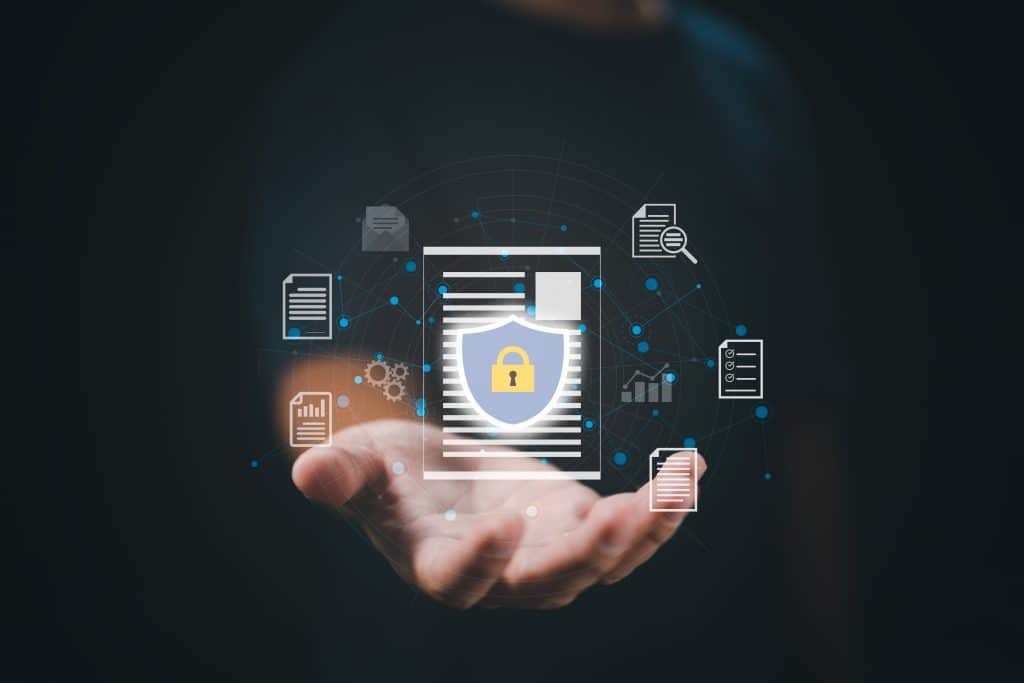New 2025 Data Privacy Laws in the U.S.: Ensuring Compliance

New 2025 data privacy laws in the U.S. are set to redefine how businesses handle customer information, demanding proactive compliance strategies to mitigate risks and ensure robust data protection.
As the digital landscape evolves, so too does the imperative for robust data protection. The advent of New 2025 Data Privacy Laws in the U.S.: Ensuring Compliance for Customer Information is shaking up how businesses operate, demanding immediate attention and strategic adaptation. Are you prepared for the sweeping changes ahead?
Understanding the Evolving Privacy Landscape
The United States is witnessing an accelerated shift towards a more stringent data privacy environment. While a single, overarching federal law comparable to Europe’s GDPR remains elusive, a patchwork of state-level legislation is rapidly expanding, creating a complex web of requirements for businesses handling customer data. This dynamic landscape necessitates continuous monitoring and adaptation.
The push for enhanced data privacy stems from growing consumer awareness regarding personal data usage and a series of high-profile data breaches. Legislators are responding by enacting laws that grant individuals greater control over their information, imposing significant obligations on companies that collect, process, and store it.
Key Drivers of New Legislation
- Consumer Demand: Individuals are increasingly demanding more transparency and control over their personal data.
- Technological Advancements: The rapid evolution of AI, big data analytics, and IoT devices creates new avenues for data collection and utilization, prompting regulatory responses.
- Global Standards: International frameworks like GDPR influence U.S. state-level legislative approaches, fostering a global trend towards stronger data protection.
Key Provisions of Emerging 2025 Data Privacy Laws
While specific details vary by state, several common themes are emerging across the new generation of 2025 Data Privacy Laws in the U.S. These provisions are designed to empower consumers and hold businesses accountable for their data handling practices. Companies must analyze these commonalities to build a flexible compliance framework.
Many of these laws introduce new definitions for personal information and sensitive data, often broadening the scope beyond traditional identifiers. This expanded definition means that data previously not considered ‘private’ might now fall under strict regulatory scrutiny, requiring businesses to re-evaluate their data mapping and classification processes.
Common Consumer Rights
- Right to Know: Consumers gain the right to know what personal data is being collected about them, why it’s being collected, and with whom it’s shared.
- Right to Delete: The ability to request the deletion of personal data held by businesses, with certain exceptions.
- Right to Opt-Out: Consumers can opt out of the sale or sharing of their personal data, particularly for targeted advertising purposes.
- Right to Correct: The right to request corrections to inaccurate personal data.
Impact on Businesses: Operational and Strategic Shifts
The impending 2025 Data Privacy Laws will necessitate significant operational and strategic adjustments for businesses across various sectors. Companies must move beyond a reactive approach to data privacy and embed it into their core business processes. This cultural shift is as important as the technical changes required.
From revising privacy policies to implementing new data management systems, the scope of required changes is broad. Non-compliance can lead to substantial financial penalties, reputational damage, and loss of customer trust, underscoring the urgency of preparation.
Essential Business Adjustments
Businesses need to conduct thorough data audits to understand exactly what customer information they collect, where it’s stored, and how it’s processed. This includes identifying all data flows, both internal and external, to ensure transparency and control. Furthermore, training employees on new privacy protocols is crucial to prevent human error and foster a privacy-aware culture.
Investing in privacy-enhancing technologies (PETs) and robust cybersecurity measures will become paramount. This includes encryption, anonymization techniques, and secure data storage solutions. Proactive risk assessments and incident response plans are also vital components of a comprehensive compliance strategy.
Ensuring Compliance for Customer Information: A Step-by-Step Approach
Achieving compliance with the New 2025 Data Privacy Laws in the U.S. requires a structured, systematic approach. It’s not a one-time project but an ongoing commitment to data protection best practices. Companies should view this as an opportunity to build stronger customer relationships through enhanced trust and transparency.
Starting early is critical. Businesses that wait until the last minute risk being caught unprepared, leading to rushed implementations and potential compliance gaps. A phased approach allows for thorough planning, testing, and refinement of privacy programs.
Phased Compliance Strategy
Begin by forming a dedicated privacy task force comprising legal, IT, marketing, and operational stakeholders. This cross-functional team can ensure all aspects of the business are considered in the compliance effort. Next, conduct a comprehensive data mapping exercise to document all personal data processing activities.
- Data Mapping: Identify and document all personal data collected, stored, processed, and shared.
- Policy Review and Update: Revise privacy policies, terms of service, and internal procedures to reflect new legal requirements.
- Consent Management: Implement robust consent mechanisms that are granular, easily understood, and verifiable.
- Vendor Management: Evaluate third-party vendors’ data handling practices and update contracts to ensure compliance.
- Employee Training: Provide regular training to all employees on data privacy policies and procedures.
- Incident Response Plan: Develop and regularly test a plan for responding to data breaches and privacy incidents.
Technological Solutions for Data Privacy Compliance

Technology plays a pivotal role in navigating the complexities of 2025 Data Privacy Laws. Businesses can leverage various tools and platforms to automate compliance tasks, enhance data security, and manage consumer requests efficiently. The right technological infrastructure can transform compliance from a burden into a competitive advantage.
From consent management platforms to data discovery tools, the market offers a wide array of solutions tailored to different organizational needs. Selecting the appropriate technology requires careful assessment of existing systems, data volume, and specific regulatory obligations.
Leveraging Privacy-Enhancing Technologies
Modern privacy solutions can help automate data subject access requests (DSARs), ensuring timely and accurate responses to consumer inquiries about their data. These platforms often integrate with existing CRM and data warehousing systems, streamlining the process of data retrieval and deletion. Data anonymization and pseudonymization tools are also crucial for protecting sensitive information while still enabling data analysis for business insights.
Furthermore, robust data loss prevention (DLP) systems can monitor and control data movement, preventing unauthorized disclosure of sensitive information. Implementing strong encryption for data both in transit and at rest is a foundational security measure that significantly contributes to compliance efforts.
The Role of Data Protection Officers and Legal Counsel
As the regulatory environment for New 2025 Data Privacy Laws in the U.S. becomes more intricate, the expertise of dedicated professionals is indispensable. Data Protection Officers (DPOs) and specialized legal counsel are becoming central figures in helping organizations achieve and maintain compliance. Their guidance is crucial for interpreting complex legal texts and translating them into actionable business practices.
A DPO acts as an internal expert, advising on compliance matters, overseeing data protection strategies, and serving as a point of contact for supervisory authorities and data subjects. For many businesses, particularly those with significant data processing activities, a DPO will be a strategic necessity.
Expert Guidance for Compliance
Legal counsel specializing in data privacy can provide invaluable insights into the nuances of state-specific laws, helping businesses navigate potential pitfalls and develop legally sound privacy policies. They can also assist in drafting and reviewing data processing agreements with third-party vendors, ensuring all contractual obligations align with regulatory requirements.
Engaging with these experts early in the compliance journey can help mitigate risks, identify potential areas of non-compliance, and develop a robust defense strategy in case of regulatory challenges. Their ongoing support ensures that privacy practices remain current with evolving legal interpretations and enforcement actions.
| Key Aspect | Brief Description |
|---|---|
| Evolving Landscape | U.S. states are rapidly enacting new data privacy laws, creating a complex regulatory environment. |
| Consumer Rights | New laws grant consumers expanded rights including access, deletion, correction, and opt-out. |
| Business Impact | Requires operational shifts, data audits, enhanced security, and revised policies to avoid penalties. |
| Compliance Strategy | Adopt a phased approach: data mapping, policy updates, consent management, and employee training. |
Frequently Asked Questions About 2025 Data Privacy Laws
The primary goals are to enhance consumer control over personal data, increase transparency in data handling practices, and hold businesses accountable for data protection. These laws aim to build trust in digital interactions and mitigate risks associated with data breaches and misuse.
While building on frameworks like CCPA, new 2025 laws often expand the definition of personal data, introduce more stringent consent requirements, and grant additional consumer rights, such as the right to correction. They also typically apply to a broader range of businesses.
Penalties for non-compliance can be substantial, including significant monetary fines per violation, which can quickly accumulate. Beyond financial repercussions, businesses face reputational damage, loss of customer trust, and potential legal action from affected individuals or regulatory bodies.
The initial step is to conduct a comprehensive data audit and mapping exercise. This involves identifying all personal data collected, understanding its flow, storage locations, and processing purposes. This foundational insight is crucial for developing an effective compliance strategy.
Absolutely. Technology is a critical enabler for compliance. Solutions like consent management platforms, data discovery tools, and robust cybersecurity systems can automate tasks, manage consumer requests, enhance data security, and provide essential audit trails, streamlining the compliance process significantly.
What Happens Next
Com the enforcement of the New 2025 Data Privacy Laws approaching, businesses are entering a decisive phase where preparation is no longer optional but a core compliance imperative. The accelerating push toward stricter state-level regulations signals that fragmented compliance strategies will no longer be sustainable. Organizations that operate across multiple jurisdictions must adopt a unified privacy framework that anticipates future legal shifts rather than reacting to them case by case.
Specialized guidance from privacy compliance experts — como os serviços profissionais oferecidos por consultorias dedicadas a data protection and GDPR frameworks, como os disponibilizados pela CompliancePoint — já estão se tornando referência para empresas que desejam estruturar políticas sólidas de governança de dados. Recursos como este sobre privacy compliance mostram exatamente como esse tipo de suporte pode acelerar a maturidade regulatória das empresas.
Looking ahead, early adopters of structured privacy programs will be better positioned not only to avoid penalties but to build consumer trust and market credibility. In an era where data ethics is becoming a competitive differentiator, aligning strategy with evolving privacy laws is not just compliance — it is smart business positioning for 2025 and beyond.





